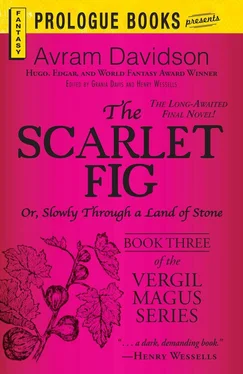Bodmi the cooper had, clearly, been shaving splints for many years, one did not take up such a craft in middle life, and his hands continued working on, on, as he gave Vergil a look of polite enquiry. “Master Bodmi, the man Benninaly,” the cooper nodded fairly rapidly, it was clear that no explanation about “the man Benninaly,” introduced by Caniacus, was at all needed; “sent me to see you about getting ‘a couple pair barrels’ for —”
“— for a caravan, yes, me ser: they would be like those setting over there in yan corner, as I’ve yet to repair, with one side concave somewhat so as to set more conveniently again the side of a caravan-beast; but them as I indicate are for the asses to carry the wine-must from the pressing-vat to the vintner’s cellar; and you would be wanting them some size larger, of course.” Vergil nodded his agreement, and for a while they discussed the size somewhat larger, and the kind of wood, and the price to be paid, and when it was to be paid; and … and then they became silent. In such a moment, in one’s boyhood, the custom was to say Zeus Prime, and so, not having said it in years, one said it now. Bodmi repeated the words under his breathy looked at his work with the splint (stave, some called it), seemed satisfied, set it down on a pile, took up another and began to shave it. Without looking up at Vergil, he said, “That lad is one of my brother’s boys, Rustus you see, me ser …”
Vergil nodded, and some comment seeming indicated, said, “An obliging and a comely lad.”
The cooper gave a sound between a gasp and a sigh, and a spasm seemed to take his face for a moment. “That’s the dreaded part of it all,” said he. Almost at once he added, “It is a terrible thing, me ser, to be the Father of man-twins!” His ser said nothing, he knew not what to say; so after a few seconds wait, said he, in a murmur, “Tell me …”
“Ah, ser! what is there to tell? By your way of speech I observe you to be a man of much schooling, and therefore you must know, that such is the doing of immortal Jove … ‘Zeus’ you may call him, Ser … and all of it comes about a cause of that lass Leda … ”
Light, after a fashion, came to Vergil. “Castor and Pollux!” he exclaimed.
“ ‘Castor and Pollux’, just so, Ser. Different ways is the story told by unlearned people, but we here in this long land and wide, we have the right telling of it. Leda, she was taken by Jove in the form of a swan, for the gods and goddesses may semble what forms they will. Aye, and out of one egg came Elen, twice a princess and twice a queen —” There were most certainly more than merely several forms of the story, but Vergil forebore to mention that: for one he did not desire particularly that Bodmi should think him unlearned, and for another he did not wish to distract the man in his telling of his own story — and one which Vergil had never heard before — “— twice a queen,” Bodmi went on; “and from out the other egg came the Dioscuri, Castor and Pollux, twin brothers they were born, clasping one another in their arms; such was their affection from the moment of birth, a rare sort of birth it was: and the shells, I means the broken-open halves of them one shell, they lies a treasure somewhere in the adyt of a temple, I believes. But I doesn’t of right know where.”
Vergil believed that the man believed, and Vergil was willing enough to know (or, at any rate, to believe) that halves of some huge eggs indeed were lying as treasures in the inner shrine of a temple somewhere, it might be anywhere, one could not be sure: but one could for sure be sure that the huge eggs had never come from within the body of any human woman: many names had that great island where lived the great bird whence issued such great egg, greater by far than any mere estridge egg: one had to make a navigation far down “the bluffs and courses of Azania,” fragrant with frankincense, past solitary stinking Zelya-Zayla, past the courting-places of the oliphaunt, and the Region called Agysimbia where the monoceroses assemble for their balloting; and farther down and farther south than that, almost an inhuman distance for an ordinary vessel to make its way — and perhaps no ordinary vessel indeed ever had made it — Hanno’s, yes … Huldah’s, yes — several names that great red island had, such as Camaracada, Phebolia, Cernea, Meruthias and Maddergaunt, Menuthia, Ophir, and the Great Red Island of the Moon: perhaps others yet to him unknow: and Marius the Tyrian had claimed it was no mere island but a continent, and a note to the Aristotle reported that it roamed with huge wild dogs striped like the Horses of the Sun … which all added together might make testimony that the place existed: testimony … certainly it was not proof … great names aside: perhaps it was not even evidence …
While he had been yet thinking of this aspect of the matter, and allowing his mind a bit to wander, as one gathering off of thorn-bushes the wool of wild muttons not beherded for the fleecing; the cooper, Bodmi, had been speaking again; and so Vergil, off gathering his wool at the ends of the world, had missed something of what had been said, so was brought up short, and quite in much confusion, by what the man Bodmi was saying now: “ … and so one of the twain must go and be a leper … ” What! What!
Bodmi, as much, perhaps, surprised by his customer’s surprise, broke off what he had been saying, almost droning; sate slightly leaning forward on his banc, one end of the splint he was holding atween his feet, and yet his hands went on with their work, went on, went on, the thin shavings falling upon his shoes: man must do his work though the heavens gin fall: perhaps after all the heavens will not continue falling, but man must continue working, all the same.
“Bodmi,” Vergil began.
“Bodmi: You must have patience with me, now, you won’t forget that I am a foreigner for all that we are both under the rule of Rome: I come from a far-off land …” — Bodmi nodded — “… and though you are kind enough to call me learned, still no man can have learned everything.” — Bodmi nodded — “Tell me then, though I don’t wish to cause you pain: why is it that ‘one of the twins must go and be a leper,’ why, Bodmi, why ?”
And so the man began again, though this time, the current of his mind and thoughts having been interrupted, and it being necessary to accept that Vergil did not know everything about the matter, he went on without his previous fluency: broken, halting, slowly, as one who endeavors to explain to a child something which the grown man has known so long he has been without the habit of having to explain it.
It was because of the dishonor of, one might say, the ravage, worked on Leda, king’s daughter though she was: not that it wasn’t an honor for a mortal to serve the god, any mortal, any god; if a goddess wanted pleasure of a man, might she take it, too, as Aurora did of Tithonius. But why hadn’t immortal Jove (“Zeus” many call him) assumed, or, if it weren’t assumed, why hadn’t he appeared to Leda in his shape as a man, and courted her as any suitor? or if she needed be tooken saunce consent: again: why not as a man, why! ser! it must have been a shocking thing! forced by a swan! though folk talk of swans as lovely, graceful things, still, they be main powerful brutes, ‘tis said swan can break a man’s leg with the force of its wing! and no more to be beat off, swan, than avoid Nemesis — some say it were Nemesis, not Jove; some say, Jove be Nemesis. Eh! and so therefore thus the reason why one of all man-twins born here syne then had to go and be a leper …
… and still, all through the telling of this dire tale, the sweet scent of the cooping-wood, newly cut, newly sawn, freshly shaved, was fragrant on the air: no slow sad clamor of the leper’s bell and no noisome feculence of the leper’s olor defiled the dry still air …
Читать дальше











